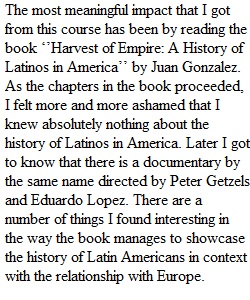


Q • Question 1 50 out of 50 points After engaging a variety of materials with a plethora of information, I am sincerely curious about your connection - if any - to things that were brought up throughout the course. While each of us has a specific experience we call our own, that does not mean we do not have shared experiences with people we have never met. Please share what aspect of the assigned materials you found interesting because you felt a connect with what another community experienced. For example, for me, I was born in Juarez/Juaritos and raised in Chicago - during the 1980s and 1990s. So, I feel a connect to Puerto Rican folks we read about. In fact, a good friend is Puerto Rican and we grew up together. So, for me, reading about Puerto Ricans was a connect that became very real. So, share whatever you want - however you want. You don't need to be connected like I was to the reading - but let me know your thoughts about things you found interesting and connect them to your experience. Use a 3 pargraph (minimum) response to support your answer. Find 2 examples to support your thoughtrom any part of the book. Use in-text citation: (Gonzalez, pp. xx) at the end of each quote/example. • no heading or title is needed • times new roman font or comic sans • indent paragraphs. • punctuation, grammer, capitalization, sentence structure is important • correct citation is required. • only use information from the section referenced in the question • no wrong or right answer: Im checking to see how you organize your thoughts • you can use examples from other parts of the course - even movies but you must have 2 examples from this section. • quotes longer than 1-typed line will be heavily penalized. • Paragraphs = 4-7 sentences. • Question 2 50 out of 50 points In the section, "Puerto Ricans: Citizens Yet Foreigners", Gonzalez states that "The third generation of Puerto Ricans, those who came of age in the late 1980s and the early 190s, found themselves crippled by inferieor schools, a lack of jobs, and underfunded social services" (p. 95). • Why do you think Puerto Ricans experienced such obstacles that Gonzalez referenced above? How do did those things afffect said community and, more importantly, why the Puerto Rican community? Use a 4 pargraph (minimum) response to support your answer. Find 2 examples to support your thought. Use in-text citation: (Gonzalez, pp. xx) at the end of each quote/example. • no heading or title is needed • times new roman font or comic sans • indent paragraphs. • punctuation, grammer, capitalization, sentence structure is important • correct citation is required. • only use information from the section referenced in the question • no wrong or right answer: Im checking to see how you organize your thoughts • you can use examples from other parts of the course - even movies but you must have 2 examples from this section. • quotes longer than 1-typed line will be heavily penalized. • Paragraphs = 4-7 sentences.
View Related Questions